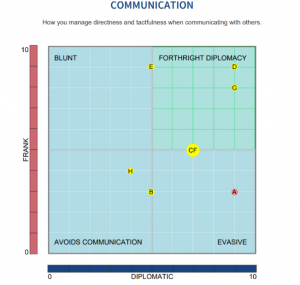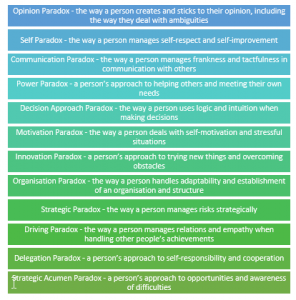Paradox as a Chance for a Team
Imagine you’re a coach putting together a soccer team. Which criteria would you use to select players? If we think logically, you would probably go for those with the best performance, the fastest players or the best shooters. However, if you’re an experienced coach, you’ll know that a bunch of good players do not necessarily make a strong and successful team. A team is not just a sum of its members and it’s not enough to have a team composed of the best members for it to be successful, but those members have to function well together. Managers in the modern business world came to this same conclusion as coaches.
In addition to individual members’ qualities, a team has an additional value which consists in the power of interaction between different talents and their contributions. Efficient team work and team functioning affect employees’ commitment, retention, and performance, but also profitability and overall business results, which makes them necessary for continuous success of an organization. Nevertheless, it can be very challenging to select and efficiently form a team of talents who are able to work together every day and achieve the best results. How to build a successful team when its members differ in preferences, perspectives, skills, experience, and habits? One of the solutions is choosing an appropriate assessment tool which provides detailed team screening and answers the following questions: what are the strengths and weaknesses of its members and how does a team function as one? Harrison Assessments stands out with its innovative and detailed approach to team assessment.
What makes the Harrison team paradox analysis unique?

The Harrison team paradox analysis places each team member on 12 XY graphs related to achievement, interpersonal relations, and leadership. This provides a deep insight into the team interaction and the way in which each member’s behavior facilitates or impedes attaining team’s objectives. Another benefit is that these results reveal strengths, but also weaknesses and conflict zones in a team, so they form the basis for creating development action plans for individuals and the whole team. These action plans provide specific guidelines on which adjustments and
improvements are required for individual members so that overall team functioning and achievements could be enhanced. Also, the analysis enables mapping individuals’ conduct in stressful situations and they way this reflects on individual and team performance.
In other words, if you want more efficient interaction among team members or improve team performance, the Harrison methodology will be a simple and efficient guide.
The magic underlying reliable and comprehensive results of the Harrison assessment is the Paradox Theory. According to this theory, there are 12 pairs of (paradoxical) traits, which account for overall human behavior (Figure 2). Each pair is composed of two seemingly contradictory traits, which are at the same time synergistic and equally important for success. For instance, the paradox relating to the way in which a person communicates with others encompasses two opposite ways of communication, namely diplomacy and frankness.
The key ingredient of success is balance. In other words, each trait can be a strength or trigger for a problem depending on whether it’s in balance with its  counterpart. The balance (equal development of both traits within a pair) enables a person to act in accordance with both, as needed. Such flexibility and versatility enable success and attainment of objectives. For example, when it comes to communication, a person with diplomacy and frankness equally developed may communicate in both ways, as appropriate. They can adjust the way they communicate to people with different communication styles and react appropriately to most situations. This enables them to attain their goal, convey their message and communicate successfully.
counterpart. The balance (equal development of both traits within a pair) enables a person to act in accordance with both, as needed. Such flexibility and versatility enable success and attainment of objectives. For example, when it comes to communication, a person with diplomacy and frankness equally developed may communicate in both ways, as appropriate. They can adjust the way they communicate to people with different communication styles and react appropriately to most situations. This enables them to attain their goal, convey their message and communicate successfully.
The team paradox analysis pinpoints on the above 12 pairs of paradox the position of each team member, thus providing a detailed view of each member’s behavior, while at the same time comparing their result against that of the team.
The Harrison team analysis results do not only enable you to find the best members for your team, but also to assign them with a position where they can play at their best, i.e. to devise a winning team strategy like an experienced coach.
Even the most experienced coaches have their assistants. Let Harrison Assessments be yours when you manage your teams.